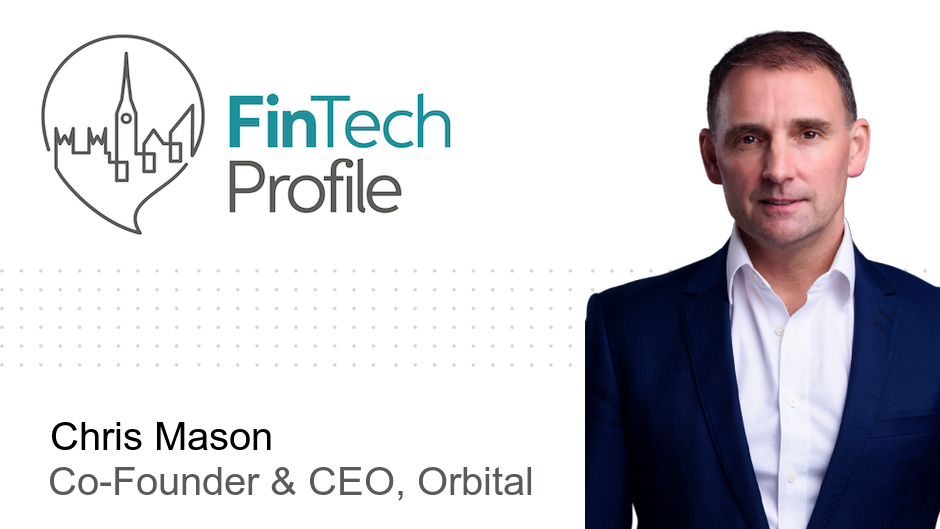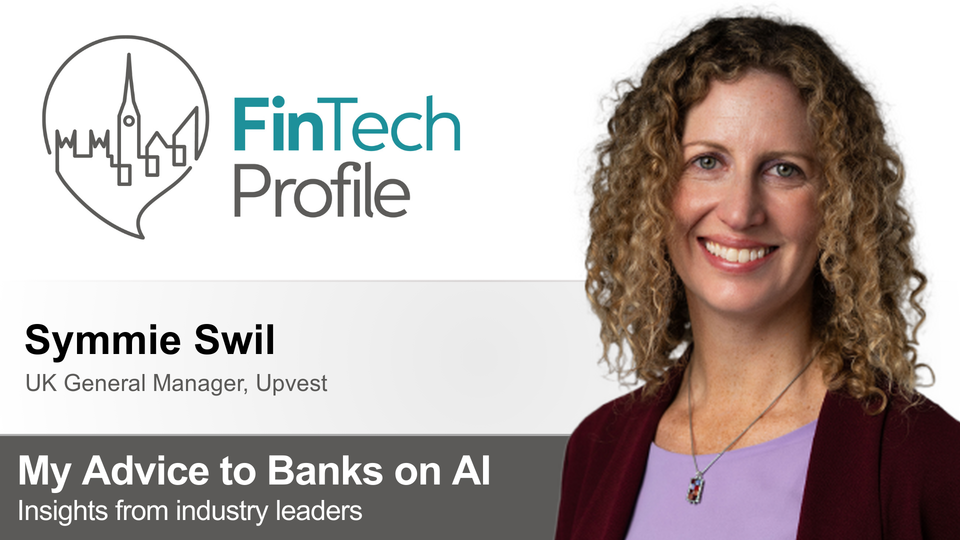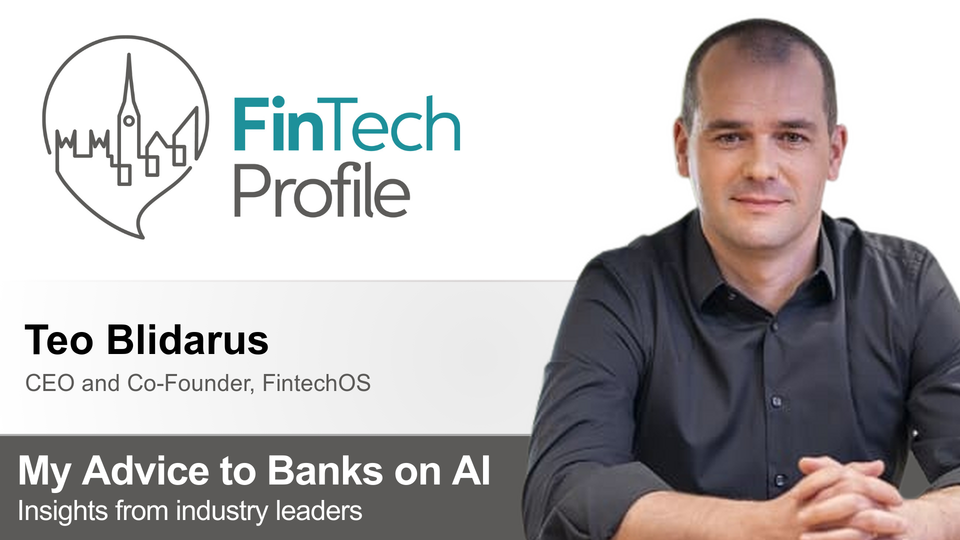Chris Mason, Co-founder and CEO of Orbital

Today we're meeting Chris Mason, Co-founder and CEO at Orbital. They specialise in delivering secure, seamless and compliant stablecoin and traditional payments for enterprises through their global cross-border payment orchestration platform.
Over to you Chris - my questions are in bold:
Who are you and what's your background?
How much time do you have? We could be here all day! My name is Chris Mason and I am the CEO and Co-Founder at Orbital. Before I entered the payments industry, I studied Accounting and Finance at Middlesex University, going on to receive my ACA qualification a few years later. My journey into the fintech industry was a natural progression. My first big break came in 2000 when I joined Citi Commercial Cards Business to lead the General Management & Development Team. That experience not only deepened my engagement with payments, but also propelled me into leadership roles at Citigroup, AIB Merchant Services, WaveCrest, and Worldline. As the fintech space evolved, I became more sought after due to my expertise in payments and knowledge in a space which had a lack of seasoned professionals. Believe it or not, I have now been in the payments industry for 25 years.
What is your job title and what are your general responsibilities?
As Co-founder and CEO of Orbital, I lead the company's strategic direction and ensure we execute operationally to deliver on that vision. I set the overall vision for Orbital to address fundamental problems in global enterprise payments, particularly between traditional banking systems and digital assets like stablecoins.
Day to day, I engage with clients to understand their pain points and demonstrate how Orbital's hybrid platform: bridging stablecoins and traditional finance, can meet their needs. I also closely monitor product development, compliance operations and partner integrations, ensuring that the platform is fixing cross-border payments through regulated, enterprise-ready stablecoin solutions that meet the evolving needs of global businesses. From overseeing engineering priorities to advocating for Orbital in the fintech ecosystem, I blend startup agility with institutional experience to drive innovation in global payments.
Can you give us an overview of your business?
We are reinventing how global business payments work. Orbital is a hybrid payments platform purpose-built to help enterprises manage cross-border transactions more efficiently with stablecoins and traditional finance. We empower finance teams to move money seamlessly across borders, whether it be through stablecoin settlements or fiat rails, while maintaining cost efficiency, transparency and compliance.
Orbital was built to bridge the gap between traditional financial infrastructure and modern digital assets. As stablecoins move into their 3rd stage with increasing regulation, institutional adoption and corporate demand, Orbital is uniquely positioned to lead. It provides a compliant, enterprise-grade solution that integrates with existing financial systems while unlocking the benefits of blockchain-based payments.
Having weathered the volatility of the crypto market, Orbital stands out in the crowded crypto space as a stable, forward-thinking platform that empowers businesses to transact globally with confidence, efficiency, and regulatory assurance. Trusted by fast-growing global companies to power their international payment flows, we are the most comprehensive solution for orchestrating both crypto and traditional payments, giving businesses the ability to have access to more than 80 currencies with integrated support for stablecoins, bank wires, and FX management.
Tell us how you are funded?
We bootstrapped the business from the very start, and gradually grew the business investing revenues, enabling us to recruit 140 people over time. We raised around $6m about 2 years ago, most of which went into regulatory capital. We are currently considering an accelerated growth plan through external funding.
What's the origin story? Why did you start the company? To solve what problems?
After spending 20 years or so managing payments businesses in numerous different areas, such as card issuing, card acquiring and transaction banking, it became clear that multi-currency corporate cash management and cross-border payments was an area that the Financial Services industry still hadn't solved, particularly for larger and medium sized businesses operating globally with counterparties in emerging markets.
Personally it was time for me to step out of corporate life, and start my own venture, so after discussing possibilities with others, we founded Orbital in 2017 with a clear mission: to take a compliance-first approach to solving cross-border payments, with a strong focus on customers doing business in emerging markets where infrastructure gaps often slow payments.
Initially, we focussed on solving some very specific problems for some large customers, which fuelled our expense base to quietly build the underlying infrastructure for stablecoin-powered payments long before the sector gained mainstream attention. Fast forward to today, stablecoins are rapidly entering the financial mainstream, and Orbital is scaling fast to meet that demand.
With compliance at the core of everything we do, Orbital now has over 1M+ transactions and processes $12Bn+ annually—a testament to the strength of our technology and the global shift toward more efficient, borderless financial infrastructure.
Today, we operate as a multi-licensed fintech with crypto entities in Gibraltar, Estonia and Switzerland, a payment institution in the UK and EMI in Gibraltar that combine our services to provide an enterprise payments platform combining both traditional and blockchain rails.
Who are your target customers? What's your revenue model?
We chose to initially focus on solving payment problems for 'digital first' companies operating globally, to avoid raising capital, preferring sustainable revenue growth. Today Orbital's capital efficiency, and mature stablecoin technology means it is well positioned for accelerated growth.
If you had a magic wand, what one thing would you change in the banking and/or FinTech sector?
If I had a magic wand, I'd fix the fragmentation in cross-border payments infrastructure, creating a borderless financial system where money moves as freely, instantly, and transparently as information does for domestic payments in most markets. For decades, cross-border payments have been stuck in the past: expensive, opaque, and painful for businesses. Despite all the innovation in consumer fintech, enterprises are still dealing with outdated SWIFT rails and fragmented systems. What the world needs is a new global financial layer, built on programmable money, interoperable infrastructure, and stablecoins operating under clear, forward-thinking regulation. A system where businesses, no matter where they are, can transact with the same speed, certainty, and control they expect from any modern digital payment system. That's the future we're building toward at Orbital and it's long overdue.
What is your message for the larger players in the Financial Services marketplace?
After riding out the crypto winter, the landscape has shifted significantly. We've entered the 3rd stage of stablecoins where more regulation, more institutional adoption and growing demand from corporates is pushing stablecoins into the financial mainstream. The marketplace is increasingly recognising how stablecoins are being used to power new financial products that are globally accessible — enabling faster, more transparent, and cost-effective payments for businesses and consumers alike. With the emergence of fintechs being built around stablecoins, these start-ups have started building cross-chain financial rails that focus on accessibility, programmability, and interoperability. As a result, stablecoins are more than a crypto-native tool, forming the backbone of next-generation financial infrastructure. The conversation has shifted from "why stablecoins?" to "how do we integrate them?"
Where do you get your Financial Services/FinTech industry news from?
I get my financial services and fintech news from a blend of trusted industry publications, analyst reports, and curated expert commentary. For daily updates, I rely on sources like The Financial Times, The Block, and Decrypt — they strike a good balance between traditional finance and emerging tech, providing interesting angles on key topics and issues.
However, since its inception in December, Orbital's very own Stablecoin Payments Dashboard has garnered my attention. It's an intelligence tool designed to offer unique insights into stablecoin flows, retail payments trends, and emerging market activity, all backed by real-time data. Whether it's tracking which stablecoins are gaining market share or understanding payment behavior in emerging economies, the Dashboard gives me a much sharper view of what's actually happening beneath the surface.
It's also a great source of commentary and visual snapshots that go beyond the headlines and provide the context that covers all bases, which is essential when making strategic decisions or responding to market changes.
Can you list 3 people you rate from the FinTech and/or Financial Services sector that we should be following on LinkedIn, and why?
- I highly recommend Simon Taylor, writer of Fintech Brainfood. He is one of the most influential figures in the Banking and Fintech industries, respected by top financial institutions. Fintech Brainfood, Simon's own personal forum, is particularly engrossing as he provides insightful commentary on the latest news and trends in financial services.
- I also recommend following David Birch, Principal at 15MB Ltd. He is a recognised thought leader and keynote speaker in the digital identity space, providing insight into digital financial services. I particularly like his IT blogs and his column in Financial world.
- And last but not least, Micheal Shaulov, CEO at Fireblocks is a valuable LinkedIn voice for anyone working in financial services. He shares sharp, forward-thinking insights on topics like AML, stablecoin regulation, financial crime trends, and emerging technologies such as synthetic data and AI in compliance. With a strategic lens and clear, engaging commentary, his posts help professionals stay ahead of evolving risks and industry developments—making him a worthwhile follow for those in fraud prevention, compliance, or fintech leadership.
What FinTech services (and/or apps) do you personally use?
In general, I use a wide range of fintech services - I love Wise for my consumer cross-border payments as it's incredibly user-friendly and it provides a fast, cost-effective, and transparent way to manage international payments and multi-currency accounts.
I'm faithful to First Direct who I banked with since they were founded in 1989. Their service is flawless and shows that you can go a long way if you get the basics right. I use ApplePay for everyday face to face payments, and online where it's available. It's hard to improve on that experience.
What's the best new FinTech product or service you've seen recently?
Parcha is really moving the needle to leverage AI to cut down on a lot of the desk work required by compliance teams to onboard new clients. There is a lot of hype and fanfare about AI at the moment, but every now and then, you find a company using it in a way that really delivers value. I think the "safe" use of AI is going to add a lot of value to the work done in compliance, reducing unnecessary human leg work, so our compliance experts can spend more time reviewing than writing.
Finally, let's talk predictions. What trends do you think are going to define the next few years in the FinTech sector?
A decade after their invention, stablecoins will become more mainstream within the fintech sector in the coming years - backed not only by market demand, but increasingly by governments and major institutions. What we're witnessing is no longer experimentation, but a global race among jurisdictions and industry players to define the rules, capture market share, and shape the future of cross-border payments.
Governments, enterprises, and technology providers will accelerate the stablecoin shift. Regulators will make a more concerted effort to advance frameworks to retain control over monetary policy, while corporates will drive demand for stablecoins to solve cross-border inefficiencies and hedge inflation. Meanwhile, tech firms will build scalable, interoperable infrastructure in partnership with banks to deliver the needed liquidity.
Together, these forces signal a shift from early adopters to the early majority. Stablecoins won't be ubiquitous overnight, it may take a decade, but the path is clear. In the same way that WhatsApp made messaging open, instant and borderless, stablecoins are poised to do the same for money. As we reach the tipping point for digitally native money, the question is - what is your stablecoin strategy?
Thank you very much, Chris!
Read more about Chris Mason on LinkedIn and find out more about Orbital at getorbital.com.
Orbital's disclaimer:
Disclaimer: The views and information shared here are for general informational purposes only and do not constitute financial, investment, legal, or other professional advice. Authors do not guarantee the accuracy or completeness of the content. Products and services mentioned may not be available in all jurisdictions and are subject to applicable regulations. Orbital does not recommend buying or selling any particular digital assets and makes no representation on the suitability or reliability of any such asset. Readers should conduct their own due diligence and consult with a qualified advisor before making any financial decisions.




